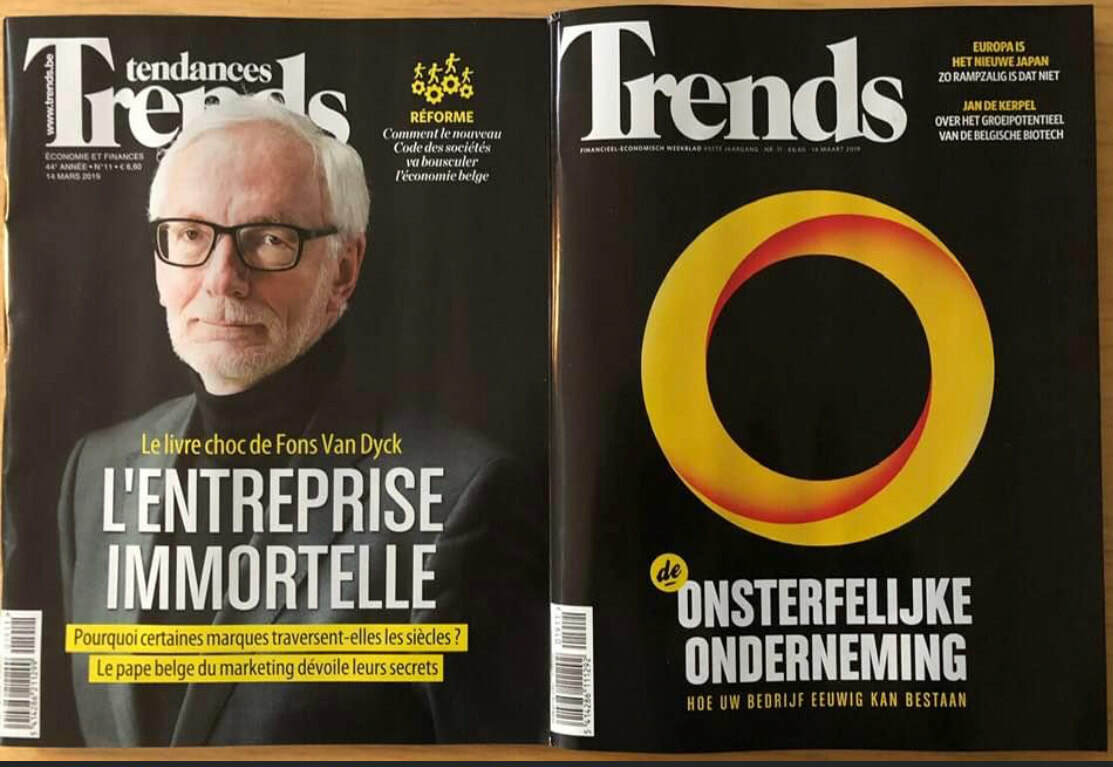
It is 4 years ago this week that my book 'The Immortal Enterprise' saw the light of day. I answered the question of how organizations, enterprises, brands can survive in disruptive times. A pandemic, a war, an economic crisis beyond that, the question, and even more the answer, remains burningly topical. Also for Delhaize today.
The book was based on 6 years of research in the context of my PhD under the expert guidance of the lamented Caroline Pauwels and Mark Elchardus. To answer the central question of how enterprises can survive, I sought inspiration in the works of American sociologist Talcott Parsons. He had developed a paradigm in the 1950s about the functions that social systems must perform in order to survive in the longer term.
I validated sociological theory in its applicability to corporate strategies and empirically applied it to Apple's story. The company of the late Steve Jobs had often gone through very turbulent waters over a period of more than 40 years, with a near bankruptcy in the mid-1990s. Something that only baby boomers may remember.
Apple's resurrection in the 21st century didn't always go down a path of roses, either. In that respect, it was fascinating to not only map out the success formulas of an organization, but for me it was even more fascinating to go deeper into the failures. Yes, Steve Jobs also made mistakes on a regular basis.
Crises are often described as an opportunity, but the sustainable resurrection is never guaranteed in advance. It is generally assumed that it is important for organizations to adapt smartly to a rapidly changing environment. That is the popular management version of Charles Darwin's theory of evolution: only those who change will survive. In recent years, too, many organisations and companies in sectors tormented by pandemic, crisis and war have made frantic attempts to adapt. This includes Delhaize in our country, which is confronted with fierce competition, more expensive suppliers and consumers who spend less money when it comes to daily purchases.
Adapting is therefore necessary, but is not enough to survive and be successful in the longer term. In fact, it is downright dangerous to shoot around wildly under the pressure of external circumstances (increased competition, for example), to improvise, or to pull out palliatives that may offer relief in the very short term, but which will often only accelerate its demise in the medium term. The changes must therefore be part of a long-term strategy with concrete and achievable objectives that are rigorously put into practice. Often also by daring to say 'no' to tempting short-term opportunism. This sounds very familiar to many entrepreneurs. But it is not always consistent to implement. There is often a deep gap between dream and deed for managers.
However, it is only half the story. In my book The Immortal Enterprise, I describe Apple's rise, fall, and resurrection over a period of more than 40 years. I discovered that organizations also need to integrate into their new environment. That it is essential to find allies, to build bridges with partners and customers, rather than choosing the path of conflict. And that the survival strategy, however clever on paper, only has a chance of success if its own employees are motivated and support the new course in solidarity. The employees are the first and most important ambassadors of a company, and should be in difficult circumstances. That is also a lesson for Delhaize today.
The most important finding, however, is that any change must start from the DNA, the identity, the values of the company. The most important question is not what needs to change, but what will not change? In order to prevent a change strategy from turning into a chameleon strategy in which the company, and its brand, loses itself, the identity, the values, the purpose must be safeguarded. It was no coincidence that Apple's resurrection in the late 1990s was ushered in with the iconic "Think Different" campaign that reaffirmed Apple's original values. In the first place to our own employees, but also to the partners and customers. They wonder today whether 'their' Delhaize will still be itself tomorrow.
Many companies today are faced with a devastating choice. In order to survive, they must adapt to changing times, without compromising their DNA, their values, their true nature. Standing still, or burying one's head in the sand is not an option. Denying oneself as a brand is not either. It is a delicate balancing act, but necessary to remain relevant, unique and successful in the medium term. In a crisis, the real leaders stand up. Hopefully, Delhaize's leadership has done its homework well and completely. Not only in the interest of the shareholders, but also of employees, partners and customers.
Written by BBDO Belgium Team, We create effectiveness